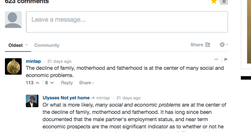Overview: Social Media Strategy
Social media can be a time- and resource-vampire if it's not integrated into the rest of your communications strategy.
How is your social media strategy? Are you simply broadcasting your content? That's inexpensive, but you're simply adding to the noise. Do you really want to be part of that problem?
The secret is to not have a "social media strategy": as a separate strategy, it will prevent social media becoming an integral part of your content marketing, community development, digital transformation and innovation strategies.
It also tends to put social media in Team Ghetto, when you should be mainstreaming it across your workforce.
Instead, view social media as a set of tactics within an integrated communication strategy, with each social platform harnessed to your overall communication goals.
Need help? Get in touch.
More services: start with Communication strategy.
Relevant resources

Apparently we are all now "little more than webs of flesh spun over packages of saleable data", according to a searing indictment of Google's anti-anonymity policy specifically. This is required reading for anyone interested in a balanced view of anonymity, privacy and public discourse: "The Google+ so-called "real name" policy can best be descr…
"Huffington Post’s U.S. site and mobile apps will shift to using only Facebook comments, CTO Otto Toth announced. “This is far from an an end to conversation; it’s the start of conversation where you want to have it — and where you’ve been having it already,” he wrote. Readers are having a Facebook conversation under Toth’s post, but many of the…

"We’ve been on Livefyre comments for a little under a year now, and while we weren’t the biggest fans of Facebook Comments* while we were using them, we’ve since realized that there is no perfect solution for commenting. And Facebook Comments, as troubled as they can be, are actually not that bad. ... until someone invents a perfect solution... w…

" a buggy Livefyre launch, with lots of you using it and breaking it, is still better than Facebook Comments." - Commenters, We Want You Back | TechCrunch
"The experience of talking about race, ethnicity and culture on the Internet is nearly always deeply disenchanting. People don't even talk past each other; they talk right through each other. Prejudices harden. We find ourselves confirming our worst stereotypes of one another. And that's before the slurs fly." Some great lessons for making it wor…

Great longread. Some excerpts: 1) It's a serious problem: "these online offenses are enough to make a woman want to click away from Twitter, shut her laptop, and power down her phone. Sometimes, we do withdraw: Pew found that from 2000 to 2005, the percentage of Internet users who participate in online chats and discussion groups dropped from 28…

“Comments from readers are probably one of the thorniest problems for online publishers of all kinds… and the methods for dealing with them are all over the map... We spoke to online editors and community managers at 104 news organisations from 63 countries across the globe, plus a selection of experts from the corporate and academic worlds to id…
Interesting survey of HuffPo, Techcrunch & other experiences with changing commenting systems and policies. - HuffPost policy banishes trolls — and drives away some frequent commenters | Poynter.

An alternative to Popular Science's approach: "Climate change articles trigger some of the most heated discussions on Ars Technica... a scientific matter with political ramifications, it's also the focus of astroturfers (fake grassroots movements), trolls, and the willfully scientifically illiterate. At Ars, we take trolling very seriously... we…
One of the reasons I created this Tumblr was to use it as a 'first draft’ of a Content Hub (see post), an idea which crystallised after reading Sloan’s original content strategy piece on Stock and Flow.The Hub is basically my way of saying that there’s more to life than the Stream. Unsurprisingly, Alexis Madrigal’s piece in the Atlantic caugh…
"“The level of discourse — the difference — was pretty stunning,” Orr said. The people posting through Facebook Comments displayed anger, but it didn’t have to be heavily moderated. “On the articles, it immediately plunged into the lowest common denominator — racism, threats, vulgarity. It was night-and-day.”"

"the new feature ... gives both Gawker authors and readers the ability to filter comments based on the writers and commenters they follow, or whose content they have “liked” or given a star to. So readers can click on Denton’s name and see not only the posts he has written, but also a specific selection of comments that he has chosen to show, from…
"But even a fractious minority wields enough power to skew a reader's perception of a story, recent research suggests. In one study led by University of Wisconsin-Madison professor Dominique Brossard, 1,183 Americans read a fake blog post on nanotechnology and revealed in survey questions how they felt about the subject (are they wary of the benef…

" Popular Science has officially shut off its comment section, pointing to research showing that disagreeable comments hurt the reading experience. Or, at least, the reading comprehension. One study out of the University of Wisconsin-Madison found that mean comments under an article about nanotechnology "polarized readers," taking attention away f…
"a new kind of reblogging functionality so that readers can top the articles they share with their own headlines and introductions.... “Publishing should be a collaboration between authors and their smartest readers. And at some point the distinction should become meaningless."